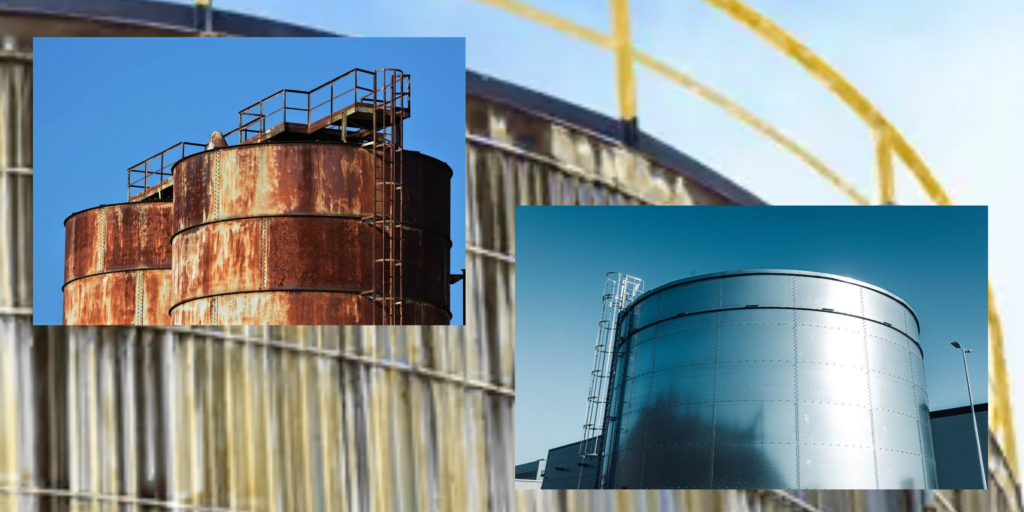
Industrial water tanks are essential for storing large quantities of water required for various manufacturing, processing, and operational purposes. These tanks are often exposed to harsh environmental conditions, chemical reactions, and prolonged usage, making them highly susceptible to corrosion. Corrosion can weaken the structural integrity of the tanks, leading to contamination, leaks, and costly repairs. Investing in better corrosion protection is crucial to ensuring the longevity, efficiency, and safety of industrial water storage systems.
The Impact of Corrosion on Industrial Water Tanks
Corrosion occurs when metal surfaces react with moisture, chemicals, and oxygen, leading to degradation over time. Industrial water tanks, commonly made of steel or other alloys, are highly vulnerable to various forms of corrosion, including:
- Uniform Corrosion: A slow, steady deterioration that weakens the tank walls and reduces their lifespan.
- Pitting Corrosion: Small, localized holes that can quickly escalate, leading to leaks and contamination.
- Galvanic Corrosion: Occurs when two different metals in contact react negatively, accelerating deterioration.
- Microbiologically Influenced Corrosion (MIC): Caused by bacteria that produce acids, leading to unexpected tank failure.
Without adequate protection, corroded tanks compromise water quality, require frequent maintenance, and pose significant operational hazards.
Why Better Corrosion Protection Is Necessary
Given the critical role of industrial water tanks, advanced corrosion protection measures are essential. Some key reasons include:
Extending the Lifespan of Tanks
Corrosion weakens tank structures, leading to premature failure. By applying protective coatings, using corrosion-resistant materials, and implementing preventive maintenance, industries can significantly enhance the longevity of their tanks.
Preventing Water Contamination
Corrosion can introduce harmful metals and bacteria into stored water, posing risks to industrial processes and human health. Effective protection ensures water purity, reducing the need for additional filtration and treatment.
Reducing Maintenance and Replacement Costs
Frequent repairs and tank replacements due to corrosion can be financially draining. Investing in long-term corrosion prevention helps industries save money by minimizing downtime and maintenance expenses.
Ensuring Safety and Regulatory Compliance
Leaking or structurally compromised tanks can pose serious safety hazards. Industries must adhere to environmental and safety regulations that mandate proper corrosion protection to prevent contamination and accidents.
Advanced Corrosion Protection Solutions
To combat corrosion effectively, industries are adopting innovative protection solutions. Some widely used methods include:
Epoxy and Polyurethane Coatings: These coatings form a protective barrier against moisture and chemical exposure, preventing direct contact with corrosive elements.
Cathodic Protection: This electrochemical technique reduces oxidation and extends the lifespan of metal tanks.
Use of Corrosion-Resistant Materials: Stainless steel, fiberglass-reinforced plastic, and specialized alloys offer greater resistance to rust and deterioration.
Regular Inspection and Maintenance: Periodic checks help detect early signs of corrosion, allowing timely intervention to prevent extensive damage.
Conclusion
Industrial water tanks play a crucial role in maintaining seamless operations across various industries. However, corrosion remains a persistent threat to their durability, efficiency, and safety. By implementing advanced corrosion protection measures, businesses can prolong the lifespan of their tanks, prevent contamination, and reduce costly repairs. As technology advances, more industries must recognize the importance of proactive corrosion management to ensure sustainable and reliable water storage solutions.
Investing in corrosion protection today will safeguard industrial water tanks for the future, ensuring uninterrupted operations and compliance with industry standards.


